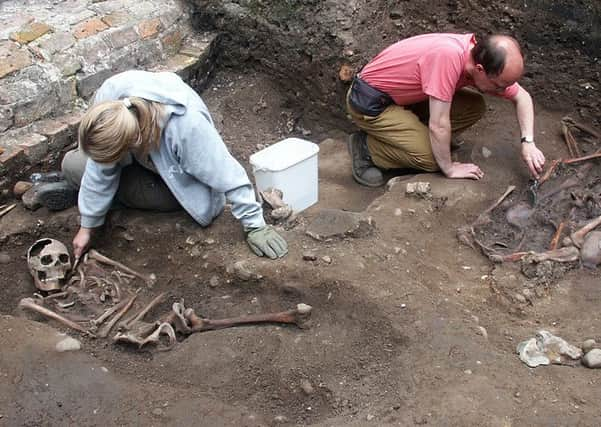YP Comment: Romans rally to York's rescue


This region is not alone. Cumbria and other flood-hit regions dependent on the visitor economy face a similar scenario, but Yorkshire does have two significant advantages over other parts of the UK – its history and also the sheer range of attractions on offer.
And while it is imperative that public pressure is maintained so that David Cameron and his Ministers do, in fact, honour their obligations to flooding victims who are still enduring a torrid time, Welcome to Yorkshire – and its partners – now have a compelling new narrative after archaeologists used cutting-edge technology to piece together the story of York’s Roman ‘gladiators’.
Advertisement
Hide AdAdvertisement
Hide AdAlthough the meticulously examined skeletons revealed much about the primitive lives led by York’s ancestors, including childhood deprivation and injuries consistent with battle trauma, it is only now that the origins of men can be traced to Wales and the Middle East in one instance.
Not only will these findings be invaluable to historians and add to the mystique of York, but it is somewhat ironic that the city’s Roman ancestry actually holds the key to this renowned riverside city bouncing back from flooding, one of the emerging phenomenons of the 21st century. The challenge now, with flood-hit attractions like the Jorvik Viking Centre closed for the foreseeable future, is using this new insight so visitors – whether they be local, national or international – have even more reason to visit a region like no other after the Romans rallied to the rescue.
HS2 business case: Trust and transparency are key
EVEN though HS2 is necessary if capacity on Britain’s rail network is to be increased for the benefit of future generations, the Government’s handling of the UK’s largest ever infrastructure project still leaves much to be desired.
This is re-enforced by a damning Parliament report which accuses Ministers of over-estimating the economic benefits of HS1, the high-speed railway route from St Pancras to the Channel Tunnel, in order to justify a far more ambitious scheme linking London and Birmingham with Yorkshire and the North West.
Advertisement
Hide AdAdvertisement
Hide AdAnd the Government’s case is further undermined by the fact that it took two years for the relevant details to be supplied to the influential Public Accounts Committee which is effectively the taxpayers’ watchdog at Westminster.
Such obfuscation, inadvertent or otherwise, creates the damaging impression that Ministers did not want this data placed in the public domain and plays straight into the hands of those who believe HS2 is a very expensive ‘white elephant’ which should be scrapped.
This would be a short-sighted view – one reason why commuter services are so overcrowded is because successive administrations failed to invest in the long-term potential of the railways. Yet, if the Government is to retain public support, there has to be trust and transparency so HS2, a £42.6bn undertaking according to the latest estimates, is built on time and on budget in a country which does not have the best track record when it comes to the completion of major infrastructure projects. Perhaps Ministers can begin by widening the pool of financial and legal advisers that they hire at great expense – a primary criticism of today’s report is that the Government should not be so over-reliant on the same cohort of ‘experts’.
A devotion to duty: 46 years pounding the beat in Richmond
IF it wasn’t for public-spirited individuals like Alan Simpson who has been a special constable in North Yorkshire for the past 46 years, the thin blue line would be even thinner.
Advertisement
Hide AdAdvertisement
Hide AdThis is a remarkable individual who has put civic duty first – whether it be deciding to shimmy up a house in the middle of the night to disable a screeching burglar alarm, breaking up town centre fights or simply providing a reassuring presence on the streets of Richmond that has been so proud to serve.
Given that his initial recruitment preceded the creation of the North Yorkshire constabulary by four years, Mr Simpson will leave big boots to fill when he retires at the beginning of next month.
And it is important that a new generation of ‘specials’ do come forward, whether it be in Richmond or elsewhere. It is this devotion to duty, and willingness to pound the beat in all weathers, which enables full-time officers to devote more time to their primary role – catching criminals.